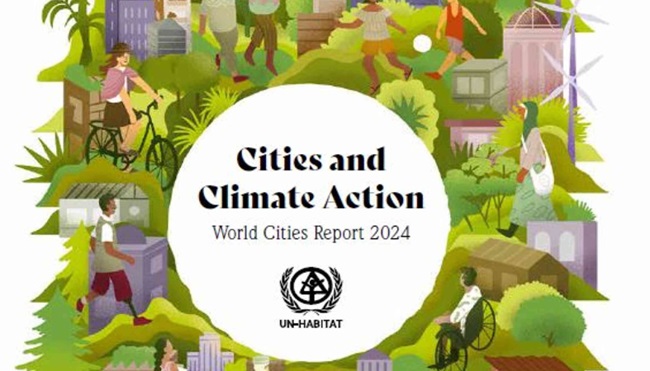|
Prelims: Current Affairs: Reports and Indices
Mains: General Studies Paper-1: Urbanization, it’s Problems and its Solutions
|
Reference:
UN Habitat released a report titled World Cities Report 2024: Cities and Climate Action.
Key findings of the World Cities Report:
- Temperature rise: According to the report, more than 2 billion people currently living in cities may face an additional temperature rise of at least 0.5 degrees Celsius by the year 2040.
- 36% of the global population living in cities may experience an average annual temperature of 29 degrees Celsius or more.
- Coastal cities: More than 2,000 cities will be located on coastal areas less than 5 metres above sea level by 2040, and this is expected to increase further by 2050.
- Flood risk: At least 517 million urban residents will be exposed to river flooding by 2030, representing 14% of the global population living in cities.
- Flood risk in cities has increased 3.5 times since 1975, compared to flood risk in rural areas.
- Economic cost: Assuming moderate sea level rise, without additional investments in adaptation and risk management, the 136 largest coastal cities could face annual losses of more than $1 trillion by 2050.
- Loss of green spaces: On average, globally, the share of green spaces in urban areas has declined from 19.5% in 1990 to 13.9% in 2020.
- Impact of the climate crisis: The climate crisis is having an unprecedented impact on many inter-related urban systems, including economic, social, ecological and urban infrastructure systems.

Related suggestions:
The following suggestions have been presented in the context of making cities resilient and climate action in this report
- According to the report, cities should be at the center of global climate action. Since cities are currently at serious risk, they need to make progress on net-zero goals with immediate effect. At the same time, resilience has to be developed against extreme weather events associated with climate change.
- Planning and design in relation to the city as well as land use are important tools for climate action. Climate responsive urban and land-use planning should be used to accelerate progress towards net-zero commitments while strengthening adaptation.
- Promoting low-carbon and resilient housing and basic services is important for climate action. In such a situation, investments in urban infrastructure should integrate climate considerations in their planning, implementation and maintenance.
- There is a need to reverse the loss of green spaces in cities for effective climate action. Changes in policies and urban planning frameworks are therefore necessary to prioritise preserving existing green spaces and creating new spaces in cities.
- More ambitious national climate commitments require greater attention to urban areas.
- Cities require significant financing for effective urban climate action. Cities should strategically collaborate with regional, national and multilateral stakeholders to reduce the urban climate finance gap from both public and private sources.
- Stronger and more collaborative multi-level governance is needed from global to national and local levels to accelerate climate action in cities.
- Bridging the urban climate data gap is essential for informed and effective climate action in cities. It is important to attract funding, scale up impact and ensure that climate action can meet the needs of the most vulnerable people.
- Resilient infrastructure is a critical element of urban climate action to achieve the Sustainable Development Goals, the Paris Agreement, the Sendai Framework and the New Urban Agenda.
United Nations Human Settlements Programme:

- Abbreviation: UN-Habitat
- Establishment: It was established in 1977 as a result of the first United Nations Conference on Human Settlements and Sustainable Urban Development (Habitat I) held in Vancouver, Canada.
- Headquarters: Nairobi (Kenya)
- Goal: UN-Habitat has been mandated by the United Nations General Assembly to promote socially and environmentally sustainable towns and cities.
- It works in more than 90 countries to promote transformative change in cities and human settlements through knowledge, policy advice, technical assistance and collaborative action.
- It collaborates with governments, intergovernmental forums, UN agencies, civil society organizations, institutions, academic institutions and the private sector to achieve lasting results in addressing the challenges of urbanization.


